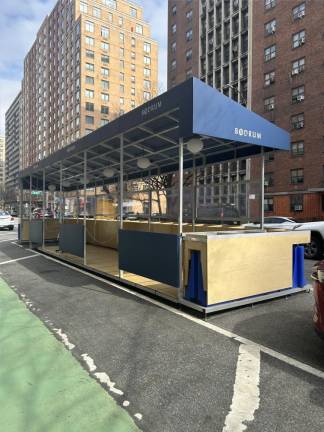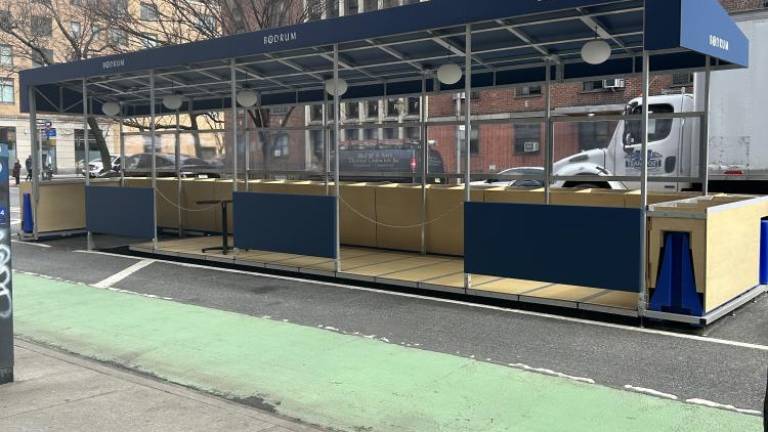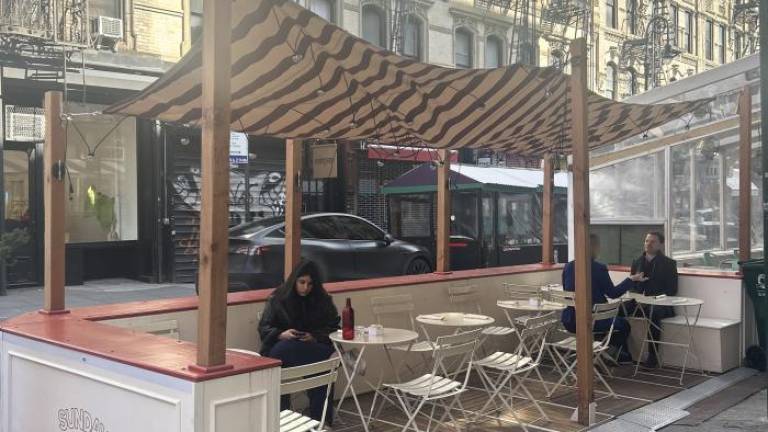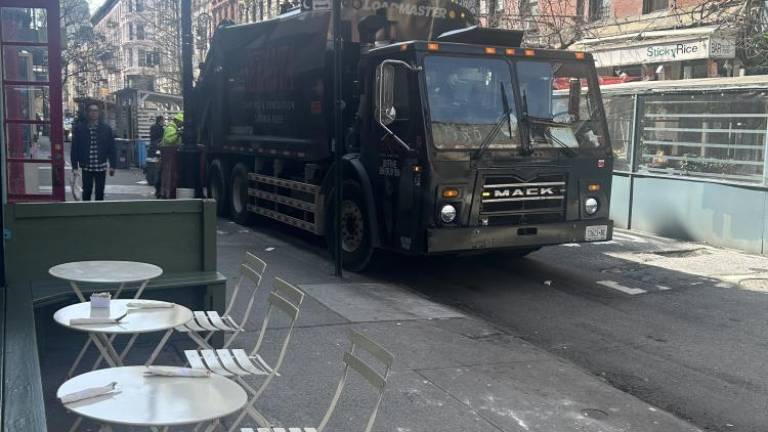Two Manhattan Restaurants Are Among First to Use New Modular Outdoor Dining Sheds
Four restaurants recently began using the new city approved modular outdoor dining sheds to replace old ones that were set up during COVID-19 as part of the Department of Transportation’s new Dining Out NYC Program. Two of the establishments are in Manhattan.




Two restaurants in Manhattan are among the first four in the city to feature the new open air modular set ups that will eventually be employed by all restaurants with street sheds across the city
The first two in Manhattan to go with the new look are Sunday to Sunday at 88 Orchard Street on the Lower East Side and Bodrum, on the Upper West Side at 584 Amsterdam Ave.
“I love it,” said Huseyin Ozer, owner of Bodrum. “So far, we didn’t finish it, but it’s very sustainable. We don’t use sand or soil anymore, instead with these aluminum containers, we can clean it wash it down, and we are not going to have pest problems.”
The other two locations are Queens: Warique in Jackson Heights and Dawa’s in Woodside.
The new sheds, unlike some of the sturdier COVID-ear sheds that often included lighting, heating and were enclosed so they could serve through the cooler months, are light weight and open air with canopies that are designed to be erected in April and taken down at the end of November when the city mandates that the street side sheds be taken down for the winter. During the emergency provisions in the COVID era, they could remain up all year. City officials are pushing new blueprints to help restaurants comply with the new program, which has been endorsed by Mayor Eric Adams and the Hospitality Alliance of restaurant owners. Some community boards and council members, especially in downtown neighborhoods, opposed the extension of outdoor dining in any form because they said it impeded pedestrian traffic, attracted rodents and cut down on already scarce street parking spots.
DOT worked with WXY, the architectural design firm, and fabricators, SITU to propose four prefabricated kits for dining structures that would comply with new city regulations that will be accessible this year.
The new sheds that will either have a soft awning, a hard awning, or one with an incline in a parking lane. They are aluminum structures that hold water containers that will have to be filled up and meet the rules of the 150 pound per linear foot making it a sturdy outside barrier, according to Jacob Dugopolski, from WXY.
The new sheds also include a modular floor system that is easier to clean and disassemble within a few hours. According to new rules, outdoor dining must close by midnight and the roadway cafes must be modular to accommodate winter storage.
“These ‘kit of parts’ is really showcasing how easy it is to sort of put together the roadway setups,” Ya-Ting Liu, the city’s chief public spaces officer, who visited the new designs said. “But also, how easy it is to take down and take apart.”
“For us, it’s worth it,” Ozer said. “These are a little bit more costly, around $30,000. The original was costly too, but once you use it, you are keep using it year after year, as long as you stay compliant.”
Restaurants will also now have to pay a fee to have outdoor dining with a four-year license costing $1,050 for a roadway or sidewalk permit, or $2,100 for both. There is also an added fee based on the size and location of the restaurant.
“When the weather is nice, the sheds provide more seating capacity, especially during COVID-19, it has helped us a lot,” Ozer said.
Another advantage is that the sheds can be customized to the restaurants brand’ with colors and writing on them, which was not the case before, according to Ozer.
The dining sheds that were once an emergency provision were codified into law by the City Council last year and placed under the jurisdiction of the Department of Transportation, since the sheds are often on streets.
“Outdoor dining has activated our streets, injecting life into our public spaces,” New York City Department of Transportation (DOT) commissioner Ydanis Rodriguez, said. “Diners can now enjoy our city’s atmosphere while supporting our small businesses. Dining Out NYC will leverage lessons learned during the pandemic to improve safety and quality of life, while allowing for creative, flexible and beautiful setups.”